Daniel Hannan Day
Hannan's 2016 article should be his and Liberal Leavers' political tombstone
Most people reading this article are probably well aware of Lord Daniel Hannan’s (in)famous article on the Reaction website, published just before the 2016 EU referendum vote. If you are not, there’s an archive copy here and it’s worth reading in full. It imagined a happy and successful future, which on 24th June 2025 would see us all celebrating our Brexit Independence Day.
Since leaving the EU, Remainers have understandably lampooned Hannan and his article, and yet there was once a half-decent explanation for Hannan’s view.
Hannan had been a key Brexiter who had long promoted an exit from the EU to EFTA - the so-called Swiss Option. Since 2005 (and actually before), he never hid his preference, which also doubled as his genuine belief that Britain outside the EU would move to a Swiss-type position. In other words, outside the EU but still very closely aligned to the single market.
The broader view of moving to an EFTA-type position (i.e. both the Swiss and Norway Options) was a majority one in the Leave movement from the 1990s through the early part of the 21st century and right up until the start of the 2016 referendum campaign. It had been pushed over the years by key figures such as Nigel Farage, Owen Paterson, Arron Banks and many others, not least because there seemed to be no obvious alternative without causing economic damage. That and the fact that Leavers often said they had little issue with the economic trading aspects of the EU - ‘the common market that we voted for in 1975’ - just the political aspect of moving towards a European Federation or so-called ‘country called Europe’.
It’s why Hannan had said with some confidence in May 2015 that “Absolutely nobody is talking about threatening our place in the Single Market”, again making reference to the Swiss (and Norway) model. Indeed he strongly emphasised this on three separate occasions in the same interview.
The point was further echoed by Owen Paterson six months later in November 2015: “Only a madman would actually leave the market”. This seemed to be a reiteration of a long speech Paterson made in 2014 about Britain taking the Norway Option outside the EU (and via a second referendum).
Then late in December 2015, Arron Banks decided that he and his Leave.EU organisation - soon to be battling for ‘lead campaigner’ status against Vote Leave - would adopt ‘Flexcit’, which was a plan to leave the EU via the Norway Option. Flexcit was written by Paterson advisor, Dr Richard North, and was also being promoted by The Bruges Group who had first formally suggested the idea of leaving via the Norway Option back in 2003 (although they originally discussed it back in the 1990s).
Yes, this widespread Brexiter belief of staying engaged in the single market after Brexit seemed entrenched.
Or so Daniel Hannan (and quite a lot of other people) thought. And that had consequences for what Hannan said and wrote in 2016, including his infamous Reaction article and a corresponding video where he said much the same thing.
One might ask, why did it not occur to Hannan or other so-called ‘Liberal Leavers’ that it might not turn out the way they wanted considering Michael Gove’s mid-campaign statements saying Britain would leave the single market?
Well for one thing, Hannan was a close ally of Gove (and Dominic Cummings), and had expressed support for Gove to be Tory leader. One could therefore imagine Gove’s emphatic campaign statement about leaving the single market as being a cunning political ‘dark art’ solely to prevent the Remain campaign having a better target to shoot at. Not only that but everyone knew that even if Leave won, it would be a Remainer parliament who would deliver the result. And that’d probably mean staying in the single market.
Indeed shortly after the referendum result, Hannan went on BBC Newsnight and reiterated the idea of ongoing single market engagement post-Brexit, much to interviewer Evan Davis’s incredulity. Hannan’s logic was now about the ‘closeness of the vote’ and he presented a Swiss/Norway relationship as something of a compromise with Remainers.
The next day, Boris Johnson had a piece published in the Telegraph which looked suspiciously aligned with Hannan’s Newsnight interview.
Those political dark arts seemed to be coming out of the closet - the UK would stay engaged in the single market but from outside the EU: A Norway-type position. Hannan’s essential sentiment would survive: that Britain would still thrive (or at least be economically OK) after leaving and - paraphrased - everyone would soon be wondering what all the fuss had been about. Even a certain David Frost, who had campaigned for Remain, wrote in the Telegraph at the end of June 2016 that we needed to take the Norway Option.
However, they - Hannan, Johnson, Gove, all essentially ‘Liberal Leavers’ - had unleashed something they could no longer control. The Leave campaigns had majored heavily on immigration (which is why Evan Davis couldn’t believe what he was hearing from Hannan), and now it was going to haunt them badly.
The clues were actually there in January 2016.
Shortly after Arron Banks decided to adopt Flexcit in December 2015 - anyone and everyone associated with Ukip and Leave.EU protested wildly about having anything to do with the EU after exit, and the Norway Option did not give them that. Banks had to rapidly reverse his decision.
Simultaneously, David Campbell Bannerman - viewed, oddly, by Brexiters as a good thinker on such matters - had been promoting an alternative exit path to the EFTA one. This was the so-called Canada Option. David Davis joined in and the idea rapidly gained traction within a few critical months. There was also increasing Brexiter emphasis on the European Court of Justice (CJEU) and about completely leaving its jurisdiction. Moreover, Owen Paterson appeared on podiums during the campaign saying he could no longer see a Norway path out.
Connect all of this to Gove’s campaign statement that Britain would leave the single market, and - dark arts or not - everyone just believed him. The UK would leave everything, including the CJEU’s influence, which was a much wider scope than merely leaving EU membership - the thing on the actual ballot paper.
In short, the Leave movement had radicalised itself throughout the campaign. David Campbell Bannerman had even started the shift towards an even harder ‘WTO-Plus Option’ and others began to follow him [he ultimately ended up with ‘Let’s Go WTO’].
Hannan’s interview with Evan Davis therefore left him ‘beached’ within the Leave movement. Boris Johnson’s Telegraph article was also attacked by Leavers as it looked like Johnson was backsliding. Some suspected he was not really a proper Leaver.
By the time the 2016 school summer holidays arrived, the Leave movement was already striding towards ever more extreme positions.
Of course, David Cameron resigned as prime minister and the subsequent leadership election saw all Brexiter candidates fall by the wayside leaving only Theresa May standing. And if anyone was going to take the apparent ‘stop immigration’ message of the Leave campaigns at face value, it was Theresa May. Which is exactly what happened. She focused on delivering an end to freedom of movement rather than an exit from EU membership per se - that was just a necessary and almost ‘technical’ pre-requisite.
May and her deal fell, and Johnson and Frost then alighted on a hard Brexit - outside the single market, outside any customs union, a border down the Irish Sea, and non-tariff barriers aplenty. Smooth trade with the EU took a beating. It left some Liberal Leavers essentially arguing that the raising of trade barriers did not really have any effect on the economy - a complete upending of their supposed free trade beliefs.
All of this left Hannan’s Brexit expectations and objectives in tatters. And it opened up his 2016 Reaction article to ridicule.
His response? To blame Remainers and the EU, while just occasionally lamenting how we managed to end up here. But because he cannot let go, cannot admit intellectual error, and cannot be disloyal to the Tory cause, he has carried on, steadily becoming more radicalised himself as he tries to remain loyal to his increasingly degenerate friends.
And for that, I’m afraid, he does deserve ridicule.
Further Reading:
The Libertarian Right - “Tufton Street” - is often thought to be entirely pro-Brexit, but this was/is not the case. The think tanks did/do not have a ‘party line’.
Here are some articles from other “Tufton Street” voices…
My decision to vote Remain, by Sam Bowman, 2016 Executive Director of the Adam Smith Institute.
Free-marketeers should support Britain’s membership of the EU, by Diego Zuluaga of the Cato Institute.
The Conservative Case Against Brexit, by Dalibor Rohac, Senior Fellow of the Adam Smith Institute, also author of “Towards an Imperfect Union”.
Why Brexit was a mistake, from a libertarian perspective, by Emmanuel Comte writing at the Institute of Economic Affairs.
Brexit wasn’t worth it, by Dr Kristian Niemietz, Head of Political Economy at the Institute of Economic Affairs.


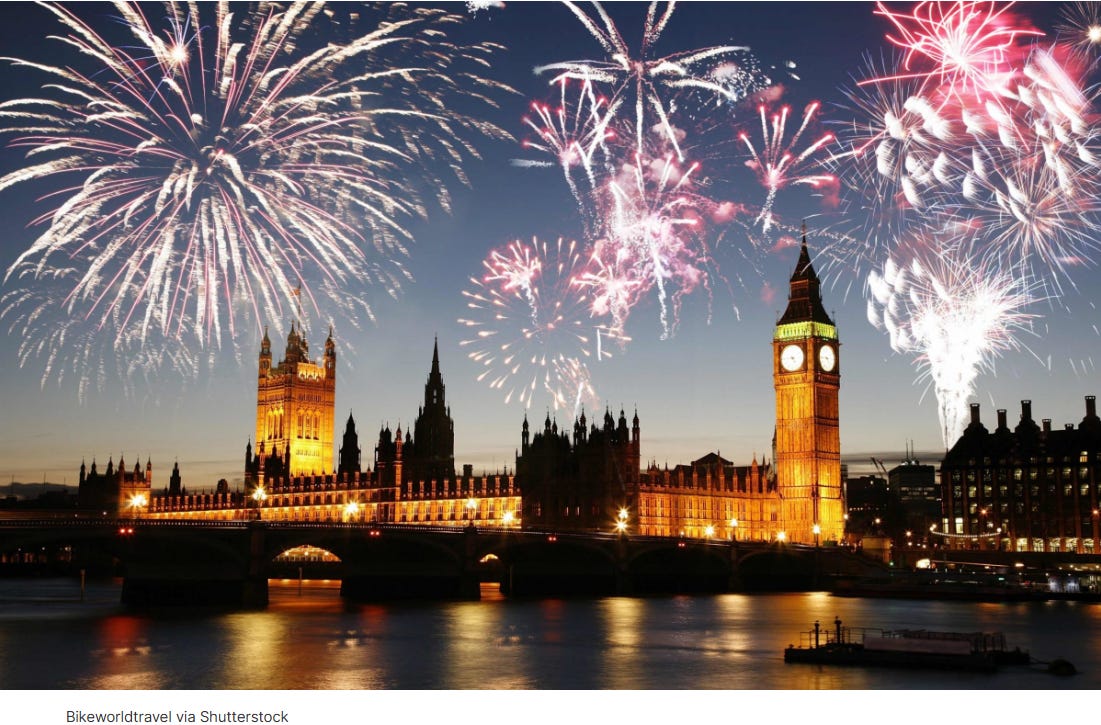
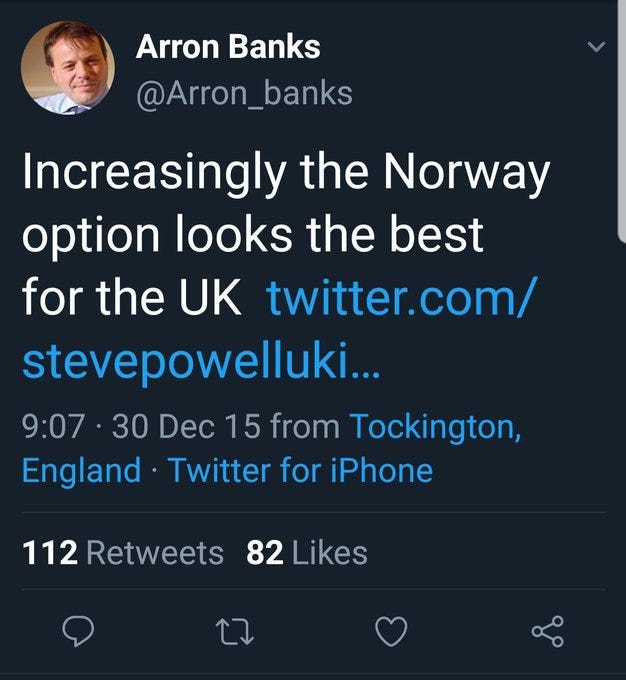
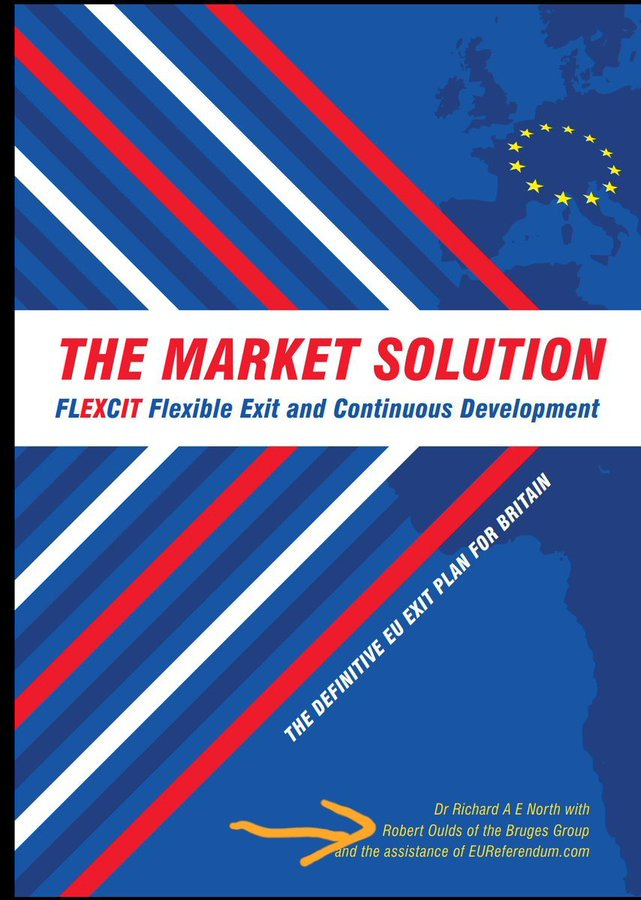
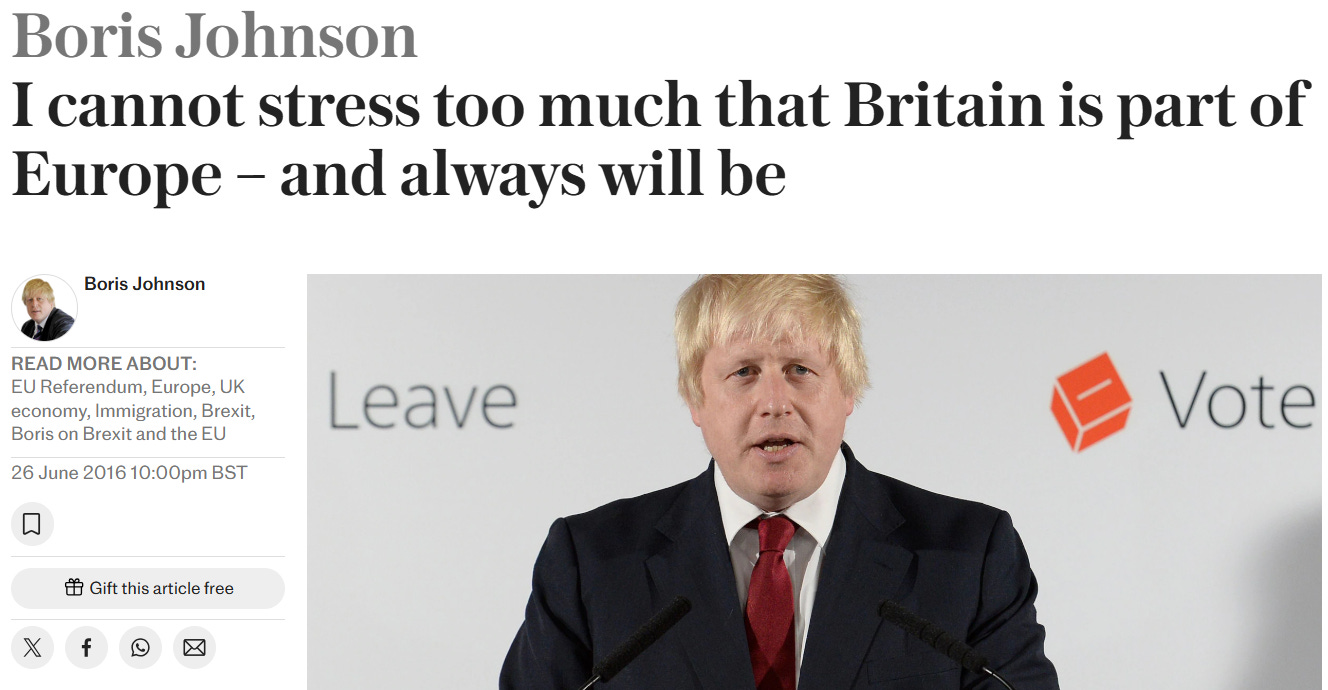
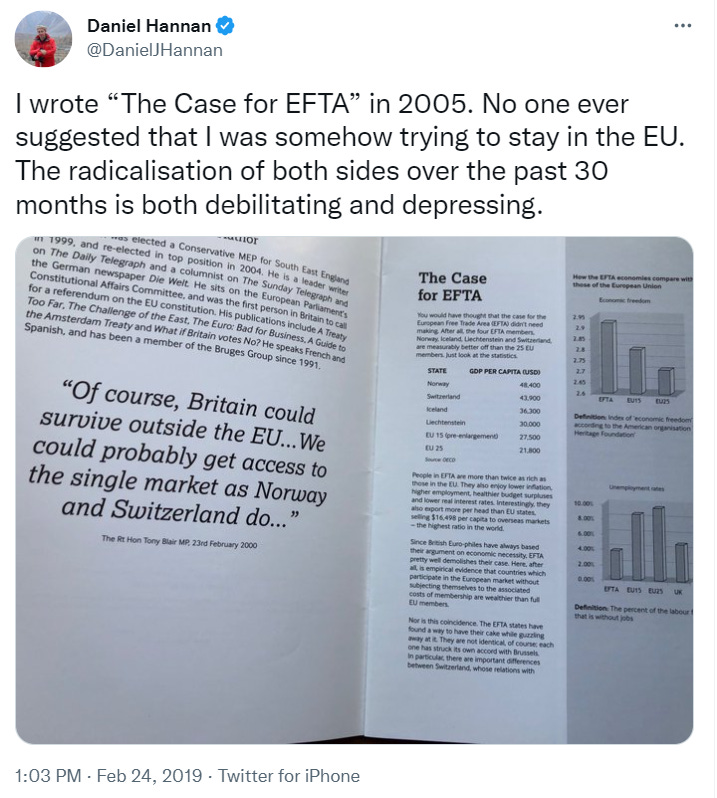
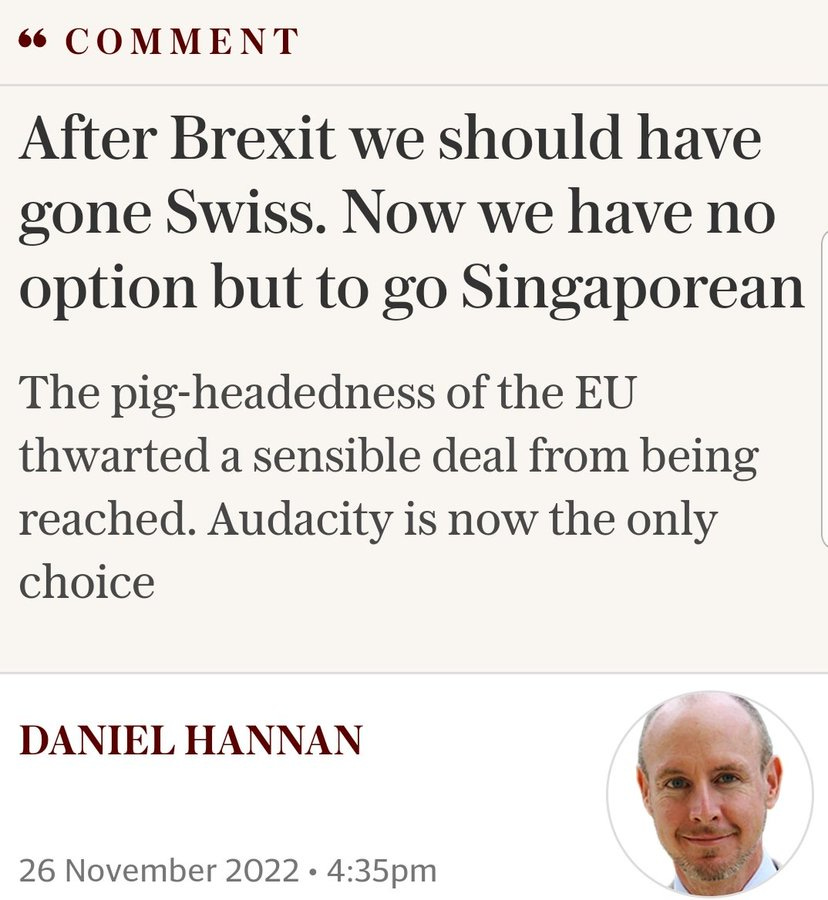
As an ardent Remainer and now Rejoiner, I think that among the many grievous errors made by the Remain campaign its failure to highlight the lack of an agreed plan for leaving was one of the most serious. Leave voters were effectively voting to jump out of the EU plane not knowing if they were equipped with a parachute or millstone.
That the Referendum Act made no provision for how or by whom the shape of Brexit would be decided was another huge failure. Pro EU lawyers in Parliament bear a particularly heavy responsibility for this lacuna. Were it not for Gina Miller parliament would have effectively made itself redundant in the whole process.
My apologies for bringing this up, but weren't you in the Liberal Leave camp yourself? I am fairly sure I followed you on the other place back in the day, not because I agreed with that position but because you always seemed sensible; and sensible voices opposed to one's own position are a good thing.
Anyway, I think many good Leavers failed to appreciate the extent to which their movement was playing into Putin's hand, which may well have been if not orchestrating it, certainly influencing it from off-stage East. Their purist Leave vision has failed because the EU did not oblige by collapsing itself.